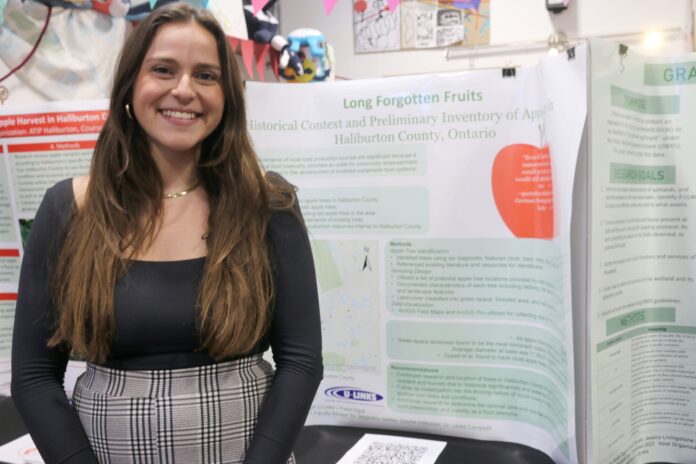After spending the past 15 months as a volunteer coordinator assisting with the Apple Tree Identification Program (ATIP) in Haliburton County, Carmen Galea is sticking around for another season – this time in a
paid role.
The recent Toronto Metropolitan University graduate confirmed she’ll remain with ATIP Haliburton until at least summer 2025, with environmental non-profit EcoCanada covering 75 per cent of her salary through its youth in natural resources program.
“Receiving this funding is incredibly meaningful for me and ATIP Haliburton. It ensures we can continue our work
identifying apple trees in the area, as well as further contributing to edible forestry in the region,” Galea said, noting her other primary responsibility is to increase biodiversity and strengthen the community’s connection to
nature.
She’s been with the group since summer
- Galea met ATIP founder Luba Cargill while preparing for the final year of her environmental and urban sustainability degree and the two instantly connected.
- Cargill, who moved to the County from the Niagara region in the early 2000s, had just launched her new movement seeking to establish a local database of existing apple tree and orchard locations. She worked
with U-Links Centre for Community Based Research to create the Haliburton County Apple Blossom Tour, encouraging people to visit known sites.
Galea has added to that early work – developing a four-stage plan to get Haliburton County excited about apples.
The first happened earlier in May – the second-annual ATIP Haliburton apple blossom tour featured more than
40 locations, including privately-owned orchards, apple trees thriving on municipal land, and businesses that carry apple-basedproducts.
Steps two through four are in-progress – Galea said ATIP is engaging with arborists, foresters, and the Haliburton County Master Gardeners to assist in improving productivity of existing apple trees. The group also wants to plant new apple trees across the County.
The fourth goal is a little more ambitious – to encourage the production of local apple cider, dried apples, and other apple products in the Highlands.
Galea believes expanding the County’s apple-based business offerings could help the local economy. It will also improve food security for struggling families, she said.
In the short-term, Galea said her focus is on supporting SIRCH Community Services’ apple sauce project. Since 2014, the non-profit has supplied 9,669 servings of free apple sauce to those in need in the community. The program relies on the support of County-based growers, Galea said.
“We’re encouraging all those with apple trees to donate their excess fruits to this excellent cause,” she said, noting one collection has already taken place with another happening later this month, or in early October.
Plans are underway, too, for next season’s apple blossom tour.
Galea said she’s excited to have the opportunity to kick start her career working on a project she feels will do a lot of good in the only place she calls home.
“I aim to continue development of new programs that address emerging needs and challenges within our community where apples and apple trees can form part of the solution,” she said. “My goal is to create a lasting legacy of positive change through apple trees, which can be enjoyed for years to come.”





